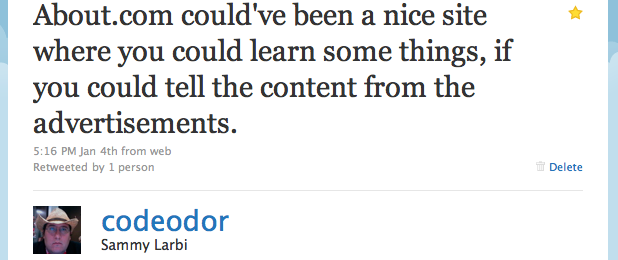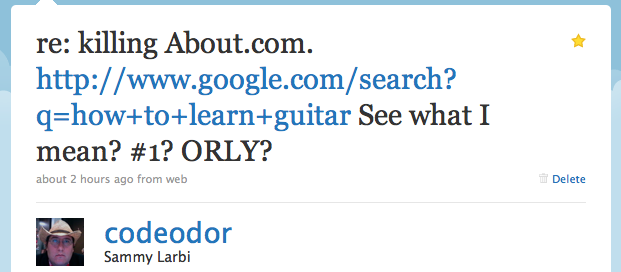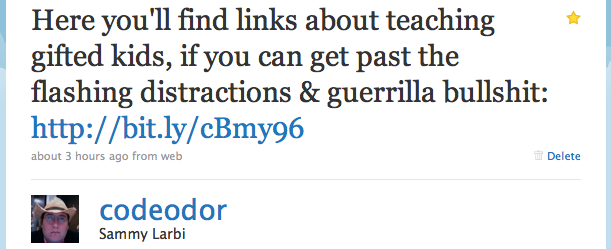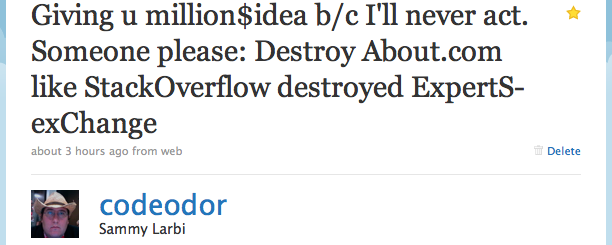There was once upon a time I held some affinity for
Expert'sExchange.
I tried hard and succeeded at becoming an expert. I thought it might look good on a resume and in fact
I got a few offers of job and freelance work from it.
I was an
expert at ColdFusion.
A couple of the guys who I remember racing for "the right answer" are still up there, including one who came after the
guys who came after the guys who came after Dain
"
OMFG do they really have a book on ACM?" Anderson. You might know
him. It might be from
cfcomet fame.
(I have no clue why my email address from back then says I have no account,
nor do I know why I'm no longer listed in the top experts even though I ha(d/ve) the points).
I used to give
EE ideas
on how to make their service better. I don't mean to sound like an ideaman -- I know ideas are only worth something
when they're executed -- but I told them I'd
implement the ideas for them. A simple one that I harped on was: instead of
getting X number of email notifications on a question, send me the first one, and only send me subsequent emails if I've logged in.
This was before
RSS days, so I had no way to stay up-to-date without it
(or shittons of irrelevant emails).
It wasn't a hard thing to implement. It didn't matter though: my suggestions fell on deaf ears.
And the site, as you know, tried to maximize earnings while ensuring
it's audience remained pissedoffandalienated.
That's right, when I stopped contributing, EE became an outhouse on the web. I take full credit: when I left,
EE began its downfall.
Seeing as you're reading this blog, chances are that you're a programmer.
Being such, you probably know how evil ExpertS-exchange became. You (used to) google for a problem,
and more often that not, some spammy BS from that site would show up. If you were savvy and
in-the-know, you'd not have clicked on it. And if you didn't happen to be paying attention, you'd
realize you made that gawdawful click when you saw the page loading, and immediately scroll
to the bottom to see the answer.
It was ripe for ripping and easy to pick off. That's a 20-20 hindsight thought.
StackOverflow
is
in the process of taking over EE (if
it hasn't by the time you read this). Thankfully.
But the two programmers' questions websites are incidental to this story. Actually, this story is more about business, and
recognizing a market and capitalizing on it.
A little while ago, I was looking for content to embed in a high-school course. I thought,

It's still true. But then,
at the time of this writing, I was looking for the non-clipboard-screenshot-save-as-file keyboard shortcut on MacOSX.

It looks like a pattern. But it's not yet.


Even though I already play guitar, I was wondering about how I might teach it to my daughter. I was self-taught, so I don't know how I'd go
about teaching someone else without feeling like I've crippled them. Later, after spending the evening with teachers and principals,
I was thinking about how they accommodate gifted kids.
As you can tell, it doesn't matter what I think. It doesn't matter what you think. About.com comes up in all these (seemingly?)
random cases as an authority answer to the question. What's worse: it's hard enough to tell the ads from the content for
someone you'd expect to be savvy on that. Can you imagine the hardship a "normal person" would suffer?

If it's not obvious now, the million dollar idea is to do to About.com what StackOverflow did to Experts-Exchange.
I assume About.com has some good content, but it's too hard to tell by looking at it. The position is ripe for the picking.
Create an unspamalicious About.com and you're rich.
Tell me about it if you make the attempt. I'll link it here.
Hey! Why don't you make your life easier and subscribe to the full post
or short blurb RSS feed? I'm so confident you'll love my smelly pasta plate
wisdom that I'm offering a no-strings-attached, lifetime money back guarantee!
Leave a comment
Stackoverflow wins for a reason. The internet is about free information. I want some information and I don't think paying for it guarantees better answers.
Posted by Dat Chu
on Feb 07, 2010 at 06:46 PM UTC - 6 hrs
@Dat Chu- I'm not totally convinced SO wins for that reason (I'm not saying that's not the case - just playing a little devil's advocate).
If you think of information that's free (as in $$) versus info that's not - the people charging for information have an incentive to keep their information high quality. I don't think that general case is necessarily in play here, since in the case of EE, EE is not the one providing the information - they only provide access to it. They rely on the individuals' incentives to keep quality high, which is recognized by the point system (same case in SO).
I really think SO is going to win out here because it's less of a hassle to use, not because of the innate quality of information wanting to be free. Perhaps the two are intermingled in this case, as the hassle in EE's case is due to the fact they want to charge for it.
Anyway, good food for thought. Thanks for the comment!
Posted by
Sammy Larbi
on Feb 08, 2010 at 04:48 PM UTC - 6 hrs